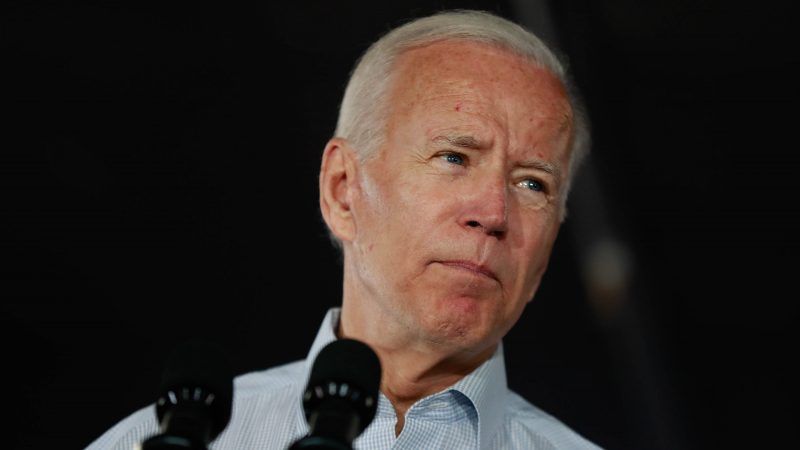Joe Biden's New Criminal Justice Platform Calls for Eliminating Harsh Policies Sponsored by Joe Biden
A breathtaking repudiation of his own legacy on criminal justice

Former vice president and current presidential candidate Joe Biden has a new criminal justice reform plan. It aims to remedy many injustices caused by policies backed by…Joe Biden.
"Equality, equity, justice—these ideas form the American creed. We have never lived up to it and we haven't always gotten it right, but we've never stopped trying," said Biden in a video released today. "The public is ready. They're ready. They've had enough."
Today I released my plan to reform our criminal justice system.
Equality, equity, justice—these ideas form the American creed. We have never lived up to it and we haven't always gotten it right, but we've never stopped trying. Learn more about my plan at https://t.co/fsdoT58qYL pic.twitter.com/qAJoFa5CqN
— Joe Biden (@JoeBiden) July 23, 2019
In the video, Biden endorses the SAFE Justice Act. That bill, first introduced in 2017, would limit the application of mandatory minimum sentences to the highest-level drug offenders, according to a summary by the criminal justice reform group FAMM.
Biden has also endorsed a list of other, more substantive reforms, including the elimination of mandatory minimums, the abolition of private prisons, the expanded use of drug courts, and the end of the death penalty. He would also eliminate the sentencing disparity between crack and powder cocaine, and he thinks states should be allowed to pursue their own cannabis legalization policies without federal interference.
That last item is more tepid than what we've heard from some of his opponents, several of whom have endorsed the full legalization of recreational marijuana. It would nevertheless represent a significant step toward more liberalized cannabis laws nationwide.
Indeed, reformers will no doubt find a lot to like in Biden's criminal justice plan. (His endorsement of expanded drug courts, which have a very mixed record when it comes to keeping people out of jail, is an arguable exception.)
The most striking thing about Biden's proposals is how much they are a rejection of the candidate's own legacy. As former Reason criminal justice reporter Radley Balko once put it, "The martial/incarceral state has had no greater friend in Washington over the last 35 years than Joe Biden."
When he was a senator from Delaware, Biden was one of the original co-sponsors on the Anti-Drug Abuse Act of 1986. That law imposed mandatory minimum sentences for drug offenders and created the sentencing disparity between crack and powder cocaine, two policies Biden now says should be eliminated completely.
Biden was also a sponsor of the Anti-Drug Abuse Act of 1988, which expanded the application of the death penalty—another policy he now says should be abolished.
In this 1991 floor speech, Biden defends both policies:
https://twitter.com/ZaidJilani/status/1113464366081413120?ref_src=twsrc%5Etfw%7Ctwcamp%5Etweetembed%7Ctwterm%5E1113464366081413120&ref_url=https%3A%2F%2Freason.com%2F2019%2F04%2F04%2Fjoe-biden-defends-death-penalty-for-drug%2F
Biden also supported the 1994 Violent Crime Control and Law Enforcement Act—indeed, he sometimes calls it the Biden Crime Law. That piece of legislation helped to drive mass incarceration at the state level by expanding federal funding for prison construction.
He now wants to that as well, with a $20 billion grant program encouraging states to shift their crime focus from incarceration to prevention.
Biden has not been totally devoid of self-reflection on his criminal justice record. He has described some of the harsh penalties for crack-cocaine as "a big mistake." Even as a senator, he criticized some mandatory minimums.
Still, it's breathtaking just how much Biden's criminal justice platform implicitly repudiates his own record. Voters will have to decide for themselves whether this represents a genuine change of heart or a more cynical attempt to stay in tune with a party base hungry for reform.
Rent Free is a weekly newsletter from Christian Britschgi on urbanism and the fight for less regulation, more housing, more property rights, and more freedom in America's cities.


Show Comments (33)